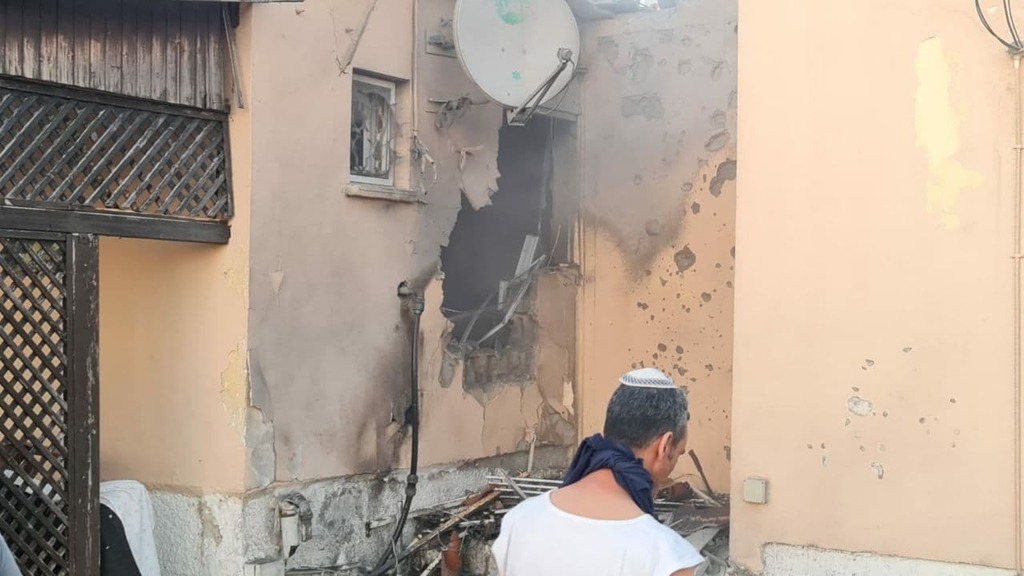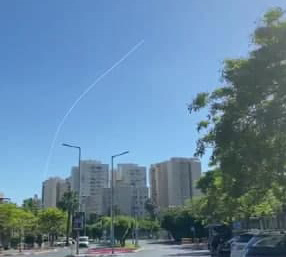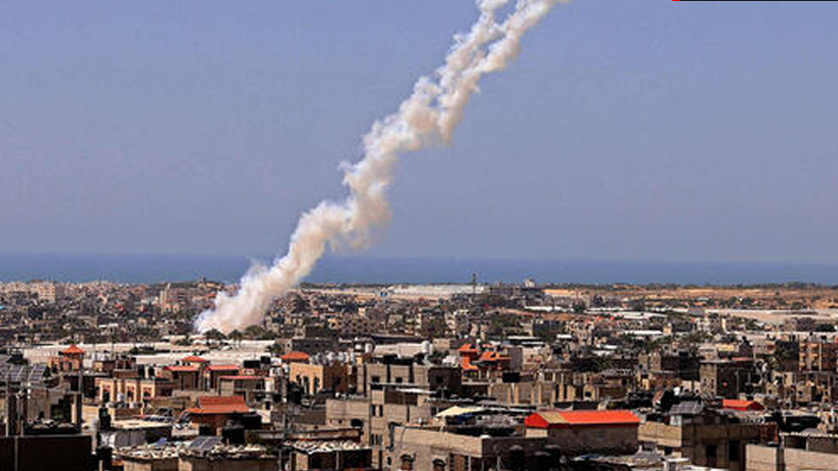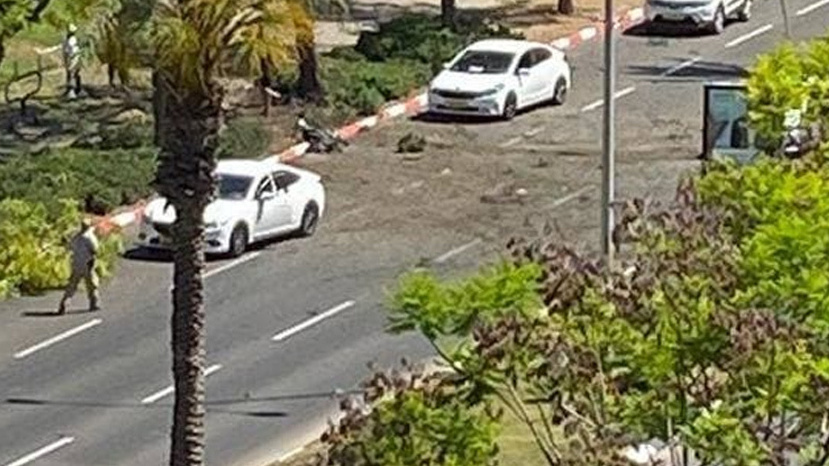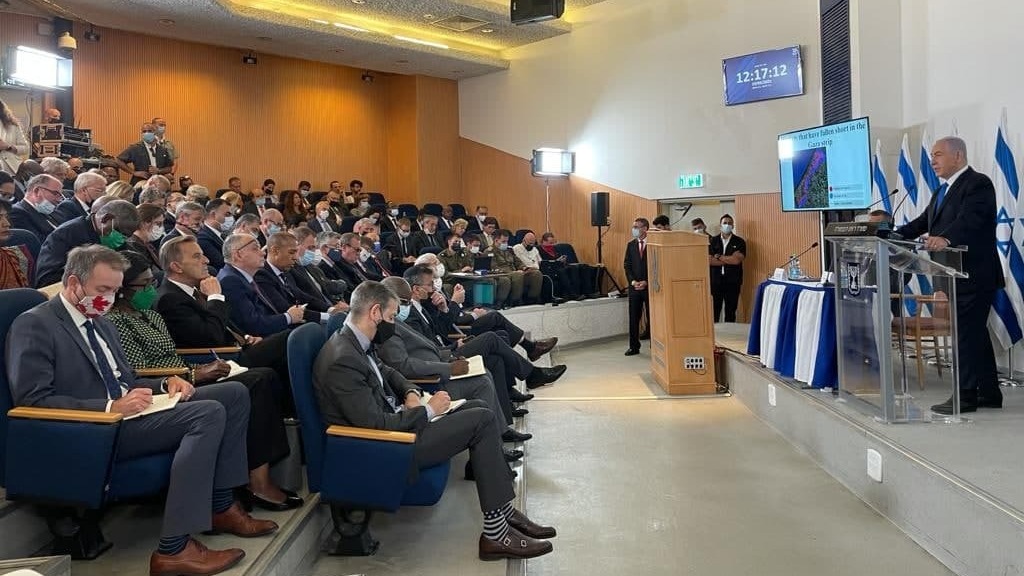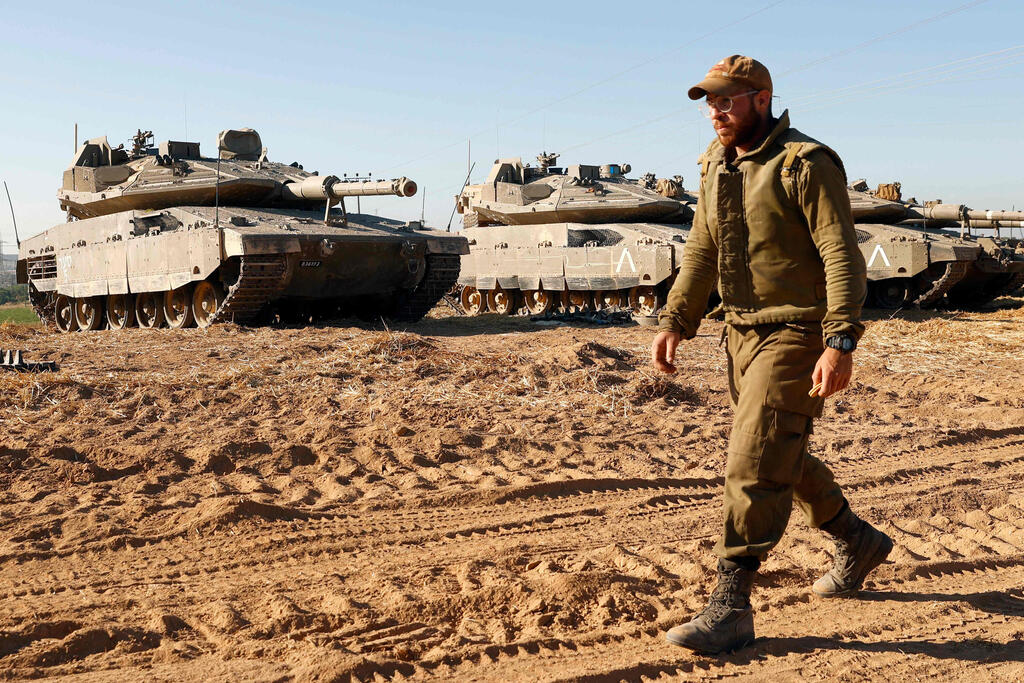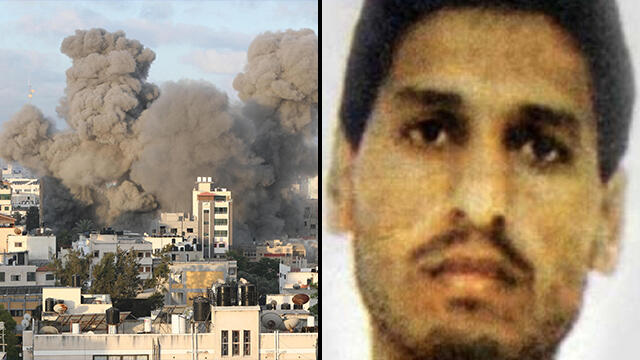Getting your Trinity Audio player ready...
Rocket sirens continued to wail throughout Gaza border communities on Wednesday evening as the IDF continued to strike terrorist targets across the Gaza Strip.
Five rockets landed in the southern city of Sderot, with one of them crashing on a private home. A man was lightly to moderately wounded from the explosion's blowback. Several others suffered from shock.
Sderot home takes a direct hit from a Gaza rocket
(Video: Magen David Adom)
Another man was moderately wounded from shrapnel earlier Wednesday when a rocket crashed near the Gaza border and was taken to Soroka Medical Center in Be'er Sheva.
11 View gallery
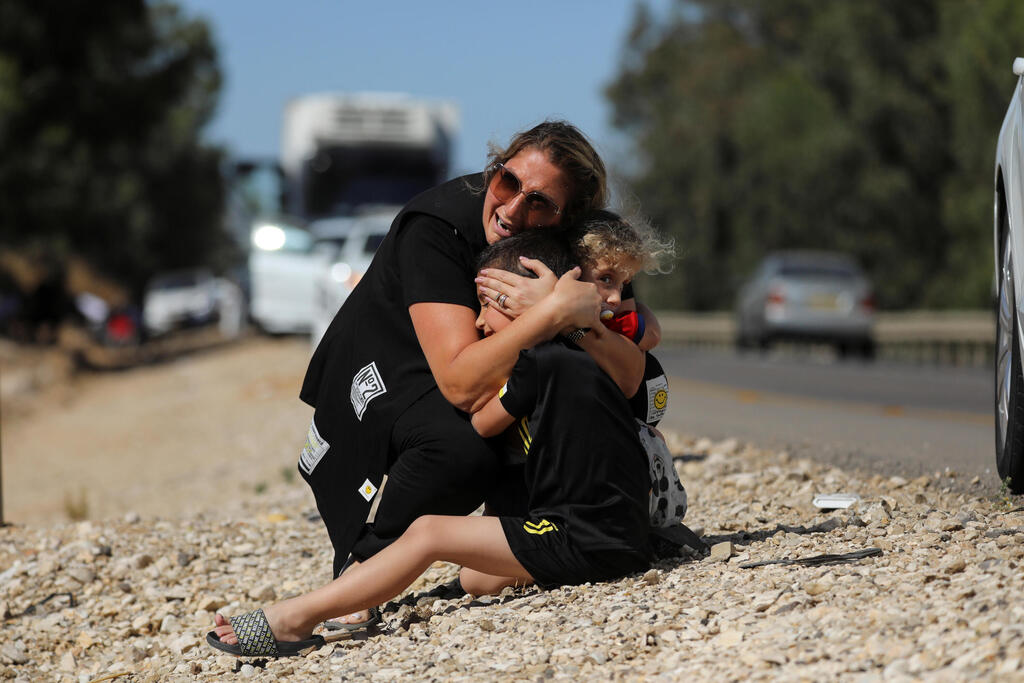

Mother shields her children near the city of Sderot as Gaza rockets continue raining down on Israel
(Photo: Reuters)
The IDF Spokesperson's Unit said on Wednesday that some 200 rocket launches have been detected between 7am and 7pm Wednesday. Some 30 rockets fell short within Gaza. Israeli air defenses managed to intercept about 90% of all rockets targeting population centers.
Meanwhile, the military also reported that it had eliminated three Hamas operatives in the Gaza overnight Wednesday in an airstrike on a hideout apartment that was used by the organization's cyber arm. The IDF said that the apartment was used by the terror outfit to carry out cyberattacks against Israeli targets.
Prime Minister Benjamin Netanyahu signaled no end to fighting just yet, despite being prodded by U.S. President Joe Biden to deescalate tensions in the Gaza conflict.
Netanyahu thanked Biden for his support of Israel's right to self-defense and said he was "determined to continue the campaign until it achieves its goal of bringing back peace and security to the citizens of Israel."
Earlier on Wednesday, White House spokeswoman Karine Jean-Pierre told reporters that "the two leaders had a detailed discussion on the state of events in Gaza, Israel's progress in degrading the capabilities of Hamas and other terrorist elements, and ongoing diplomatic efforts by regional governments and the United States."
"The president conveyed to the prime minister that he expected a significant de-escalation today on the path to a ceasefire," Jean-Pierre added.
It was the fourth call in the past week between the U.S. and Israeli leaders.
11 View gallery
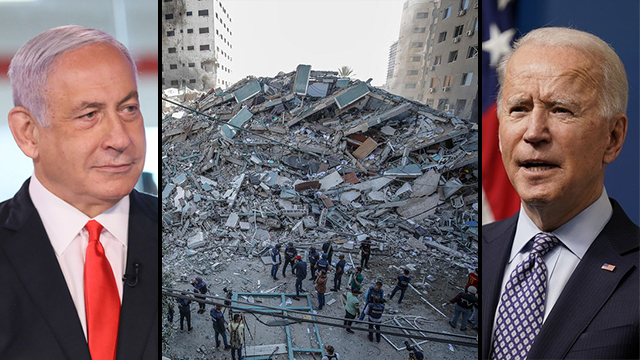

Prime Minister Benjamin Netanyahu and U.S. President Joe Biden
(Photo: EPA, AP, Hadar Yoavian)
The country's Cabinet was not slated to meet on Wednesday which ruled out the immediate possibility of calm. However, Netanyahu was scheduled to meet with senior defense officials to assess the situation on the ground.
Also on Wednesday, four rockets were launched at northern Israel from Lebanon. The IDF opened fire on several targets in the country's south in retaliation.
According to the military, one rocket was intercepted by the Iron Dome missile defense system, two fell at sea and another crashed in an open field in the Arab northern city of Shfar'am.
11 View gallery
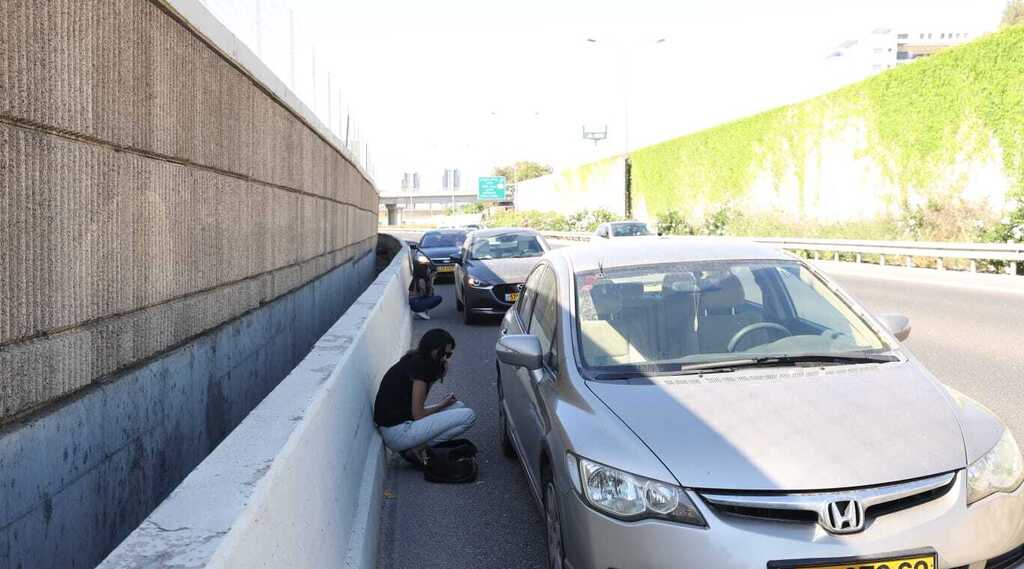

Civilians take cover from rockets on Highway 22 in Kiryat Bialik
(Photo: Elad Gershgorn)
Air-raid alarms were reportedly heard in Acre, Shfar'am, I'billin, Kiryat Bialik, Kiryat Yam and Kiryat Motzkin. Locals reported hearing loud blasts
The Magen David Adom emergency service reported no injuries from rockets but two civilians were lightly hurt while running to shelters.
Haifa, Acre and several other northern cities ordered the opening of communal bomb shelters.
Reports on Lebanese media said that several rockets were fired into Israel from the country's south.
One security source said militant group Hezbollah, which has sway in southern Lebanon, had not been involved in the launches, and that the group was trying to determine the source of the rockets.
Earlier Wednesday, the cities of Ashdod and Be'er Sheva sustained direct hits in a heavy rocket barrage that was launched at southern and central Israel by Palestinian terror groups in Gaza
Israeli leaders said they were not setting a timeframe for an end to hostilities with Hamas and Islamic Jihad despite international calls for a ceasefire. An Israeli military spokesman acknowledged that with an estimated 12,000 missiles and mortars in the groups' Gaza arsenal, "they still have enough rockets to fire".
Shortly before 3pm, a heavy barrage of rockets targeted the southern cities of Ashkelon, Ashdod and Be'er Sheva as well as the central city of Rehovot. A rocket hit a residential area in Ashdod, while a large chunk of a projectile, following an interception, landed in Be'er Sheva, where eight out of 13 rockets were intercepted by the Iron Dome.
There were no reports of injuries.
Earlier, rocket alert sirens blared in Ashdod, Ashkelon as well as communities in central Israel, such as Moshav Be'er Tuvia and the city of Yavne.
The rocket attack came shortly after the IDF struck a host of terror targets in the Strip. Among the targets are an Islamic Jihad weapons storage facility, terror infrastructure belonging to senior Hamas official, an underground rocket launching site and some apartments in a 10-story building in Gaza City. The military did not flatten the building as was done in this round of fighting so far.
Prime Minister Benjamin Netanyahu made no mention of any halt to the fighting in public remarks at a briefing to foreign ambassadors to Israel, saying his country was engaged in "forceful deterrence" to prevent future conflict with Hamas.
In remarks during a closed question-and-answer session, he was quoted as saying: "We're not standing with a stopwatch. We want to achieve the goals of the operation. Previous operations lasted a long time so it is not possible to set a timeframe."
"We try to target those who target us. With great precision," Netanyahu told the foreign envoys. "As surgical an operation as it is, even in a surgical room in a hospital, you don't have the ability to prevent collateral damage around affected tissues. Even then you can't. And certainly, in a military operation, you cannot."
In a 25-minute attack overnight, Israel bombarded targets including a network of underground attack tunnels in southern Gaza.
IDF Spokesperson Brig. Gen. Hadai Zilberman on Wednesday morning said that 15 kilometers (7.45 miles) of the so-called "metro" of attack tunnels came under strikes by 52 planes, dropping 122 bombs over a 25-minute period in the southern part of the Strip.
The IDF said the tunnels were used to launch rockets at the south and enable the movement of terrorists and weapons from inside the Strip to the sea.
The spokesperson added that after all targets in the Rimal neighborhood in Gaza City were "exhausted" on Tuesday, the overnight strikes were concentrated in Khan Yunis and Raffa, from where rockets were fired at Be'er Sheva and other southern cities and communities.
11 View gallery
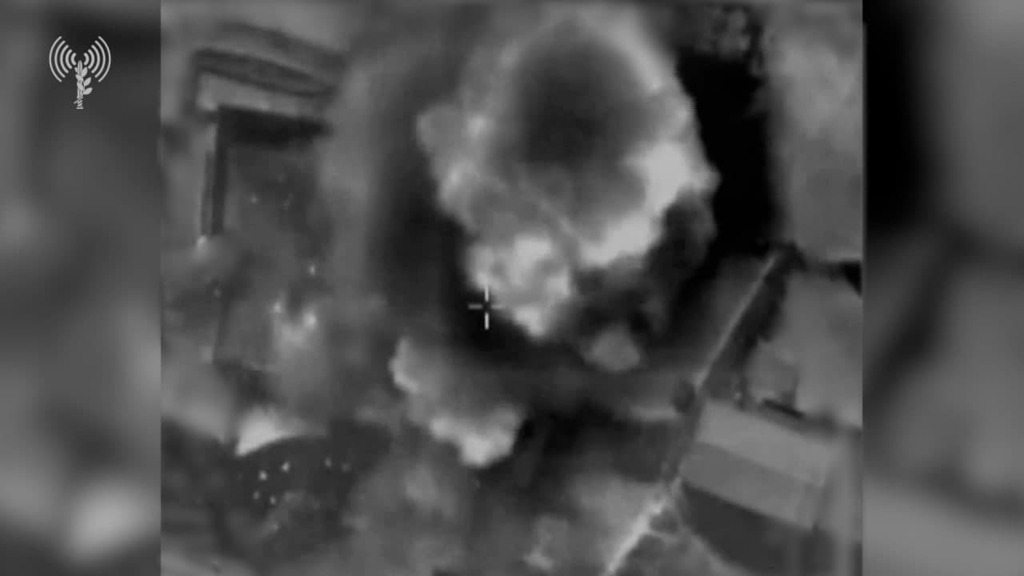

IDF footage showing bombing of Hamas terror sites
(Photo: The IDF Spokesperson's Unit)
"We hit command centers, offices of the Internal Security Services and the headquarters of the Islamic Jihad," Zilberman said, adding that at least 10 members of both the Hamas and the Islamic Jihad were killed.
Since the beginning of the fighting, more than 100 Hamas and Islamic Jihad operatives were killed. Mohammed Deif, head of the Hamas military wing and the IDF's most wanted Hamas official, has survived two attacks directed against him, according to the military.
Deif was hiding deep underground and his bunker was attacked from different directions using a variety of weapons but Israeli forces were unable to kill him. Over the years, Deif apparently survived at least seven attempts on his life, which left him disabled.
Seven other members of Hamas were also targeted by the military, some were injured but all survived, the spokesperson said.
After 10 days of hostilities, Israeli authorities put the death toll at 12 in Israel, including a 5-year-old boy, where repeated rocket attacks have caused panic and sent people rushing into shelters.
Palestinian medical officials said 219 people had now been killed in bombardments, including 63 children, which have destroyed roads, buildings and other infrastructure.





